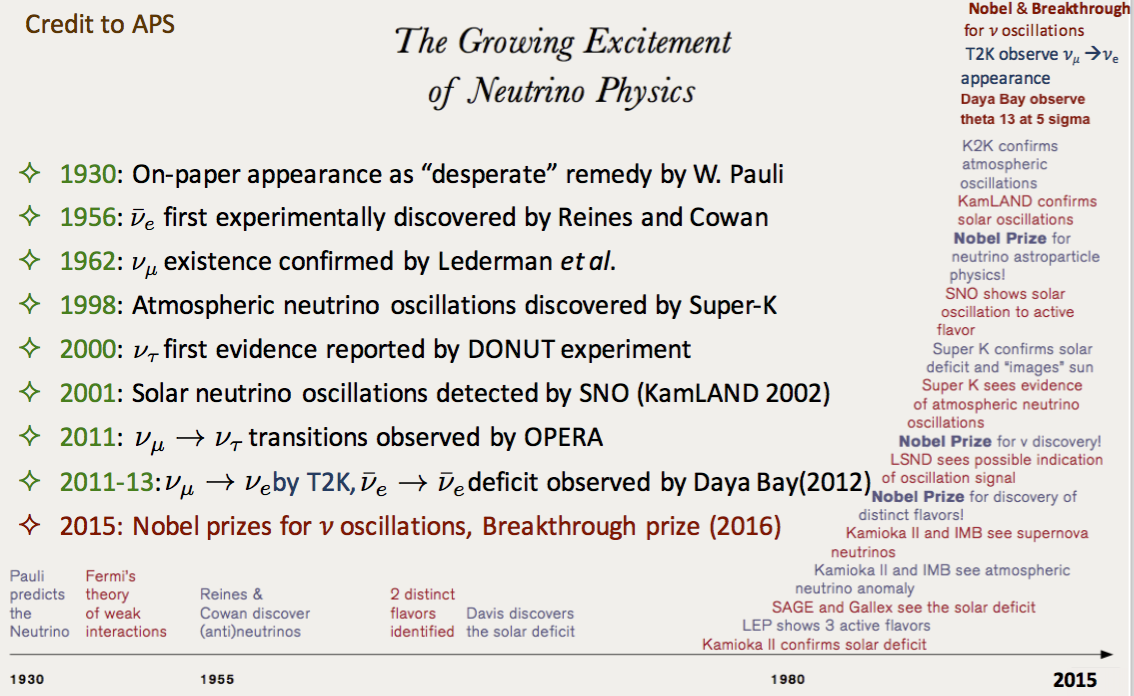Why is neutrinos physics?
Since the first on-paper appearance as a desperate remedy proposed by W. Pauli for resolving the beta decay issue in 1930, neutrino is still surprising physicists and is a main stream to explore the physics beyond the Standard Model (SM). The Nobel prize in 2015 and the Breakthrough prize in 2016 are the valuable words for the vital role of neutrino in the modern physics. Following are some reasons why we choose to start with neutrino physics:
- It is very hot topic in the modern physics. We might expect few Nobel prizes within couple coming decades for the CP violation, the neutrino mass hierarchy, the naturalness of neutrino mass, etc...
- The neutrino program is intense and for a very long term (Hyper-K and DUNE expects to start in 2026 and run data taking for 10 years. After these neutrino generation, it is predicted that a new generation of experiment will be built to explore the physics beyond the standard neutrino model.) More details can be found in the roadmap for the international, accelerator-based neutrino programme sketched by ICFA Neutrino Panel.
- The neutrino theory is not so difficult (in comparison to String Theory, for example) and experimental principle is not so complicated either (in comparison to gravitational wave detection or collider experiments). There are a number of Ph.Ds, who originated from Vietnam, have graduated from other fields than neutrino physics such as collider physics at LHC. It seems impossible for them to continue their work when coming back to Vietnam and this group thus can gather these high-level Ph.Ds. Switching from collider physics to neutrino physics might not take a lot of time, especially in experimental fields. Furthermore, we have some good groups of neutrino theory and thus having number of Ph.D candidates with quite good background in neutrino physics.
- We have friends in neutrino experiments, especially Japanese physicists such as Kajita-san, Nakahata-san, Kobayashi-san, Nakaya-san, Saito-san...; Alain Blondel and Jacques Dumarchez from Europe and collaborating with Japanese experiments; well-recognized theorists around the worlds such as Boris Kayser from Fermilab, Serguey Petcov from SISSA.. They are excited with the idea of building neutrino physics group in Vietnam, particular in ICISE (In this center, we have official-established instituted called ``Institute for interdisciplinary research in science and education (IFIRSE)”).
Why is experimental neutrinos physics?
Neutrino experiments are getting exciting, global and much bigger than before in manner of both detector size and physic potential. The NEUTRINO 2016 conference held at London, UK is the largest international neutrino conference so far with about 700 physicists. The new released results from T2K and NOvA immediately get attracted from the media although the statistic significance to CP violation, mass hierarchy is still marginal. Following are some reasons why we should consider to start with experimental group instead of theory group:
- It will be the first and unique physicist group in Vietnam. There is no official Vietnam-based working group in experimental high energy physics that collaborates with international experiments. We would like to be a part of the latest discovery in the field of high energy physics, and therefore, an experimental group would give us better chance to do that.
- Results from neutrino experiments are still very interesting within a couple decades, even more. Also, it is not just about neutrinos, but other physics potentials such as proton decay, supernova, and even new physics. This brings us a chance to involve in the top discoveries to the world. In addition, the excitement of new results might inspire a young generation of scientists in Vietnam.
- The collaborations in neutrino experiments are not big like LHC. Thus contribution of each group is well-recognized by the other collaborators. This is important for a starting group since we would like to show that we can make significant contribution.
- Neutrino experiments are getting bigger as a requirement for higher precision and possibility of new physics. The next generation of neutrino experiments, Hyper-Kamiokande and DUNE are expected to start around 10 years from now. If we can start a small group early, we can join these collaborations by the time they start to take data with a number of experienced Vietnamese physicists.
- Neutrino experiments are not so complicated in principle. In the short-term, we can start with small group working mainly in data analysis and leaving hardware development for the next step when we have enough people as well as financial support to build an experimental laboratory.
Nobel Prizes for neutrino research
- In 1988, “for the neutrino beam method and the demonstration of the doublet structure of the leptons through the discovery of the muon neutrino”, Leon M. Lederman, Melvin Schwartz and Jack Stecinberger shared the first Nobel Prize relating to neutrino research
- In 1995, Frederick Reines was received the Nobel Prize for detecting the first neutrino in 1956
- In 2002, Raymond Davis Jr. and Masotoshi Koshiba shared the Nobel Prize for detecting cosmic neutrinos
- In 2015, Takaaki Kajita and Arthur B. Mc Donald have received the Nobel Prize for discovery of neutrino oscillation, showing that neutrinos have mass.
Read more about Neutrino interactions
Read more about Applications of Key Technologies in Neutrino Exp.
Opening questions in Neutrino Physics:
- CP violation in neutrino sector? How does it relate to the leptongenesis?
- Can be measured by comparing neutrino and anti-neutrino oscillations
- How do neutrinos get mass?
- Higgs mechanism? Seesaw mechanism
- Is neutrino Majorana particles?
- Neutrino mass hierarchy?
- If inverted, so why neutrino is different from other elementary particles?
- Is the mixing angle theta_23 maximum?
- If so, what’s the underlying symmetry?
- Is sterile neutrinos existed?
Back >>>>HOME
*This site is kindly hosted by HEP Lab, Kyoto University
©nuGroup, ICISE 2016
